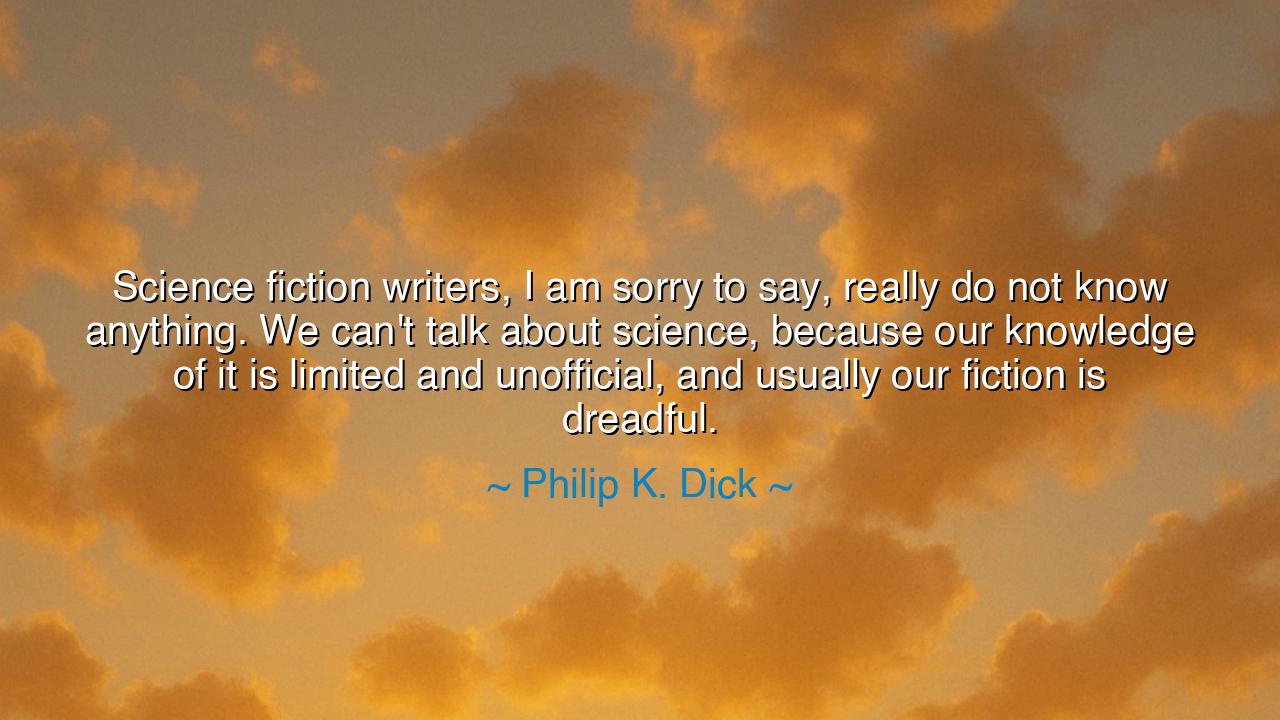
Science fiction writers, I am sorry to say, really do not know
Science fiction writers, I am sorry to say, really do not know anything. We can't talk about science, because our knowledge of it is limited and unofficial, and usually our fiction is dreadful.






The words of Philip K. Dick — “Science fiction writers, I am sorry to say, really do not know anything. We can’t talk about science, because our knowledge of it is limited and unofficial, and usually our fiction is dreadful” — are spoken not with scorn, but with humility. In these words lies the confession of a visionary who knew the limits of his craft, and through that awareness, touched something far greater than science itself — the human soul. Dick, one of the most imaginative minds of the twentieth century, did not measure truth by the precision of equations, but by the depth of perception and wonder. What he meant was not that science fiction writers are ignorant fools, but that their genius lies not in knowledge, but in intuition — in the ability to dream beyond the reach of data.
In the style of the ancients, we might say that Philip K. Dick’s humility was his wisdom. The sage knows that to admit one’s ignorance is the beginning of insight. The scientist observes the world as it is; the storyteller imagines it as it might become. Each plays a sacred role, and neither can replace the other. When Dick says that writers “do not know anything,” he acknowledges that they do not wield the exact tools of science — the formulas, the proofs, the controlled experiments. But what they wield instead is imagination, that untamable force that first inspired the scientist to look at the stars or split the atom. Knowledge begins where imagination dares to wander. Thus, in his irony, Dick reveals a paradox: by confessing ignorance, the artist becomes a vessel for revelation.
The origin of this quote lies in Dick’s own restless relationship with reality. He was not a scientist, nor did he pretend to be one. His stories — from Do Androids Dream of Electric Sheep? to Ubik — are less about technology than about the fragility of human consciousness. He wrote not to explain the mechanics of machines, but to explore the mystery of existence — how identity, memory, and morality shift in a world increasingly governed by artificial forces. When he said that “our fiction is dreadful,” he was mocking the shallowness of those who treat science fiction as spectacle, forgetting that its purpose is not prediction but reflection. For Dick, science fiction was a mirror, not a manual — a means to reveal the soul of humanity through the lenses of the unreal.
In his own life, Dick was haunted by questions science could not answer. He suffered visions, breakdowns, and moments of revelation that blurred the line between madness and prophecy. To him, the universe itself seemed uncertain — a place where reality flickered like a hologram and truth dissolved under scrutiny. His works emerged not from official knowledge, but from the margins of perception — that shadowy realm where reason falters, and imagination begins. He did not claim authority; he claimed curiosity. And it is this honesty, this refusal to masquerade as an expert, that gives his words such power.
History has often shown that great truths arise not from those who claim certainty, but from those who question everything. Consider Galileo, who, though a scientist, was driven by a poet’s imagination — daring to believe that the Earth moved when all said it stood still. Or Jules Verne, who dreamed of submarines and space travel long before science could make them real. Both the scientist and the writer share one sacred trait: the courage to imagine beyond the accepted. But while the scientist measures what can be seen, the writer seeks what cannot — the invisible yearnings of man, the fears that drive invention, the moral storms that follow discovery.
When Dick calls his fiction “dreadful,” he speaks with the humility of one who knows that imagination is both a gift and a danger. Fiction, like fire, can illuminate or consume. It can inspire generations to build a better future — or blind them with illusions of grandeur. He warns his fellow writers that without depth, without reflection, their work becomes hollow — machinery without spirit. For knowledge without wisdom, and art without humility, lead only to arrogance. True science fiction must not worship technology, but challenge it; must not glorify the future, but ask what kind of beings we will become when we arrive there.
Let this be the lesson passed to the generations: that to create is not to command knowledge, but to seek it. The writer, the scientist, the philosopher — all are bound by the same oath: to remain curious, humble, and open to mystery. Admit what you do not know, for in that admission lies the gateway to all discovery. The world is not moved forward by certainty, but by wonder — the trembling awe that precedes revelation. The ancients said that wisdom begins in fear of the unknown; Philip K. Dick teaches us that wisdom endures through reverence for it.
So remember his words, and hold them close: the greatest creators are not those who know everything, but those who dare to ask what if. Knowledge builds the world, but imagination gives it meaning. And when science reaches its limits, it is the storyteller — flawed, untrained, unofficial — who lights the torch that guides us into the darkness, toward truths that no equation can contain.






AAdministratorAdministrator
Welcome, honored guests. Please leave a comment, we will respond soon